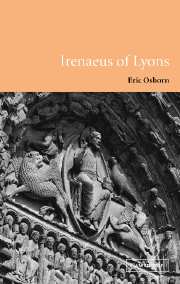Book contents
- Frontmatter
- Contents
- Preface
- List of abbreviations
- Chapter 1 Irenaeus: argument and imagery
- Part I DIVINE INTELLECT
- Part II ECONOMY
- Part III RECAPITULATION
- Part IV PARTICIPATION
- Part V CONCLUSION
- Appendix: Gnosticism
- Select bibliography
- Citations from Irenaeus
- Citations from the bible
- Index of classical authors
- Index of patristic authors
- General index
Appendix: Gnosticism
Published online by Cambridge University Press: 22 September 2009
- Frontmatter
- Contents
- Preface
- List of abbreviations
- Chapter 1 Irenaeus: argument and imagery
- Part I DIVINE INTELLECT
- Part II ECONOMY
- Part III RECAPITULATION
- Part IV PARTICIPATION
- Part V CONCLUSION
- Appendix: Gnosticism
- Select bibliography
- Citations from Irenaeus
- Citations from the bible
- Index of classical authors
- Index of patristic authors
- General index
Summary
GENERAL CHARACTERISTICS
While the differences between so-called ‘Gnostic’ groups present a permanent problem, there have been useful and concise accounts. Gnosticism is ‘a doctrine of redemption, which appeared among Christians and pagans in late antiquity’. Six common characteristics of various types of Gnosticism have been claimed:
a cosmic dualism, according to which the world is evil and ruled by evil powers. Matter and spirit are sharply opposed, but all things fall under the dominion of one or the other;
a clear distinction between the most-high, unknown God, and the God who created this world, usually identified with the creator God of the old testament;
some humans are naturally like God, bearing a spark of heavenly light, although their body belongs to an evil world;
the human condition and desire for freedom are explained by a myth of a pre-cosmic fall;
humans are liberated by knowledge of their true nature and heavenly origin;
only an elect few have the spiritual seed which determines by its presence or absence the destiny and the moral choices of each person.
Today even such a summary has been questioned; earlier generalisations are challenged and replaced by other vulnerable claims, which may be set out briefly. It may be argued that exegesis by Gnostics was not governed by a pattern of protest or reversal; that their ideas were not parasitic; that as a group, they were averse neither to the body nor to the world, neither ascetic nor libertine, neither determinist nor elitist.
- Type
- Chapter
- Information
- Irenaeus of Lyons , pp. 265 - 274Publisher: Cambridge University PressPrint publication year: 2001

